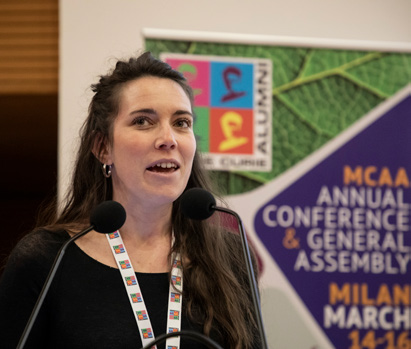News from the MCAA - Who is the policy officer responsible for the MSCA Doctoral Networks? - September 2025
Newsletter

Giulia Rizzo
Horizon Europe is the EU's research and innovation programme for 2021-2027. This programme facilitates collaboration and strengthens the impact of research and innovation in developing and implementing EU policies while tackling global challenges.
All the MSCA programmes are part of Horizon Europe dedicated to support, provide jobs and train around 65,000 talented researchers from all over the world, at all stages of their career, with new knowledge and skills in all disciplines. Through its funds, the MSCA are setting high standards for researchers’ careers and continue to achieve a long-lasting impact on European research and innovation systems, boosting cooperation beyond academia and increasing their global attractiveness and visibility.
Which are the MSCA programmes?
There are five types of MSCA programmes, targeting different objectives:
• Doctoral Networks (DN), supporting programmes to train doctoral candidates in academic and non-academic organisations.
• Postdoctoral Fellowships (PF), supporting career perspectives and excellence of postdoctoral researchers.
• Staff Exchanges (SE), encouraging collaborations between organisations through staff exchanges.
• COFUND, co-funding of regional, national and international programmes.
• MSCA and Citizens, bringing research and researchers closer to the public at large.
Part of Horizon Europe, the Marie Skłodowska-Curie Actions (MSCA) are the European Union’s flagship funding programmes for doctoral education and postdoctoral training of researchers. In this interview, the policy officer overseeing the MSCA Doctoral Networks shares his insights and experiences in science policy.
Who are the policy officers responsible for the MSCA programmes?
A policy officer is responsible to apply the knowledge in research and data analysis, together with awareness of the EU goals, to better inform policy development. This typically involves understanding the potential impact of policy changes, translating them into tangible actions and effectively communicating these implications to the affected communities.
The policy officer I spoke with is Sohail Luka, from the European Commission Directorate- General for Education, Youth, Sport and Culture, responsible for the MSCA Doctoral Networks.
According to the interviewee, an MSCA DN policy officer is in charge of designing the MSCA DN action. It means developing the actions for researchers, managing the connections with the stakeholders, and designing the programme in line with the allocated budget from the EU.
How to become an MSCA policy officer?
There isn’t a defined career path to pursue in order to become a policy officer for MSCA. Sohail Luka’s career is a prime example of intersectoral mobility. In fact he described himself as a professional nomad, owing to his diverse and interdisciplinary background.
He began in academia as a PhD fellow and teaching assistant in the USA specialised in molecular genetics, before spending nine years as a Procter & Gamble manager in the field of communication and public relations. During the academic years, he learnt scientific and teaching skills. In his industrial role, he gained expertise in communication with stakeholders, negotiation, and a goal-oriented approach, necessary in the corporate environment. Both experiences were crucial for his subsequent career steps. Afterwards, he returned to Academia as a visiting Professor in Italy and then as Principal Investigator (PI) and Head of Department in Egypt. At that point, he decided to apply his experience and knowledge toward a broader public goal, leading him to join the EU institution in 2005.
There are various types of work contracts for becoming a policy officer, including fixed-term or permanent positions secured through a public competition. In his case, he falls in the second category.
What are the positive sides and drawbacks?
For Sohail Luka, who remains perpetually optimistic, there are no downsides to this job – only positive aspects. For him, the main benefits of this role include the significant job impact on researchers and on the broader population, the autonomy in managing the work, and the opportunity to collaborate with a highly skilled and supportive team. How to become a policy officer?
How to become a policy officer?
While noting that his remarks apply to most career decisions, for those aspiring to become a science officer, Sohail Luka advises to reflect sufficiently on the reasons for pursuing such a career option. He emphasises the importance of being curious and highly motivated to continuously learn and grow in the field. Additionally, he encourages active engagement in international and multicultural events, recognising their essential role in promoting global collaboration. Finally, he shared the one question that ultimately helped him decide for every career move he made: "Am I moving forward or backward, i.e., will I become a better person and a stronger professional?"
In conclusion, science policy is a dynamic and crucial field that bridges the gap between scientific research and public impact. It involves crafting and implementing policies that support innovation, address societal challenges, and foster international collaboration. Professionals in this area must navigate complex and evolving landscapes, balancing the needs of researchers, policymakers, and the broader community. Therefore, candidates with a diverse background, including multisectoral experience in both academia and industry, are often well-suited to become the next generation of policy officers.
Giulia Rizzo
INSERM
Chair, MCAA France Chapter
france.chapter@mariecuriealumni.eu